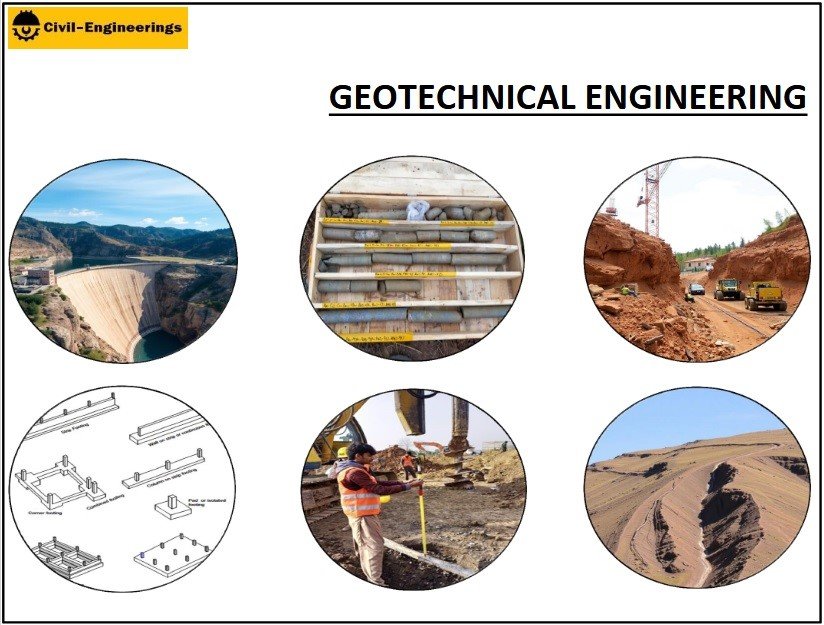The Only Guide to Specialized Geotechnical Engineering Solutions
The Only Guide to Specialized Geotechnical Engineering Solutions
Blog Article
Some Ideas on Specialized Geotechnical Engineering Solutions You Need To Know
Table of ContentsSpecialized Geotechnical Engineering Solutions Fundamentals ExplainedThe smart Trick of Specialized Geotechnical Engineering Solutions That Nobody is Talking AboutSpecialized Geotechnical Engineering Solutions Can Be Fun For AnyoneSpecialized Geotechnical Engineering Solutions for Beginners
They perform website investigations, gather examples, carry out research laboratory tests, and evaluate information to evaluate the suitability of the ground for building and construction projects. Based upon their findings, geotechnical engineers give recommendations for foundation style, incline stability, keeping frameworks, and mitigation of geotechnical dangers. They team up with other experts, such as architects, architectural engineers, and building groups, to ensure that geotechnical factors to consider are integrated right into the total job layout and implementation.
Foundation Style: Geotechnical designers play a vital duty in creating structures that can securely support the intended structure. They analyze the dirt problems and load requirements to determine the proper structure kind, such as superficial structures (e.g., grounds), deep foundations (e.g., heaps), or specialized methods like dirt improvement. They think about aspects such as negotiation restrictions, birthing ability, and soil-structure communication to create optimum structure designs.
The Only Guide to Specialized Geotechnical Engineering Solutions
Below are some kinds of geotechnical engineers: Structure Engineer: Structure designers specialize in designing and analyzing structures for structures - Specialized Geotechnical Engineering Solutions. They assess the dirt conditions, lots needs, and site qualities to determine one of the most proper foundation kind and style, such as shallow structures, deep foundations, or specialized strategies like stack structures
They do field testing, accumulate samples, and assess the gathered information to define the dirt residential or commercial properties, geologic developments, and groundwater conditions at a website. Geotechnical Instrumentation Engineer: Geotechnical instrumentation designers focus on surveillance and determining the behavior of dirt, rock, and frameworks. They set up and keep instrumentation systems that monitor variables such as soil negotiation, groundwater levels, incline movements, and structural variations to assess performance and provide early cautions of potential problems.
In the workplace atmosphere, geotechnical designers utilize specialized software devices to perform estimations, develop styles, and analyze data. Specialized Geotechnical Engineering Solutions. They prepare reports, testimonial project specifications, interact with clients and staff member, and coordinate task tasks. The office setting supplies a helpful environment for research study, evaluation, and partnership with other specialists involved in the project
They regularly see job sites to carry out website examinations, assess geotechnical conditions, and gather data for analysis. These brows through involve traveling to different places, occasionally in remote or tough surfaces. Geotechnical engineers may perform soil sampling, conduct tests, and monitor building tasks to ensure that the geotechnical aspects of the project are being implemented correctly.
Specialized Geotechnical Engineering Solutions Can Be Fun For Anyone
Geotechnical designers likewise work in specialized geotechnical laboratories. In these centers, they carry out experiments, execute examinations on soil and rock examples, and assess the design buildings of the products. Geotechnical laboratory designers work thoroughly in these environments, handling screening equipment, running instruments, and videotaping data. They collaborate with various other laboratory personnel to ensure exact and trustworthy testing outcomes.
Retaining Wall surfaces: Producing wall surfaces that hold back soil to avoid landslides and give stability on sloped surfaces. Embankments and Earthworks: Creating embankments for roads, trains, and dams to ensure they continue to be stable under anxiety. The mining industry relies heavily on geotechnical design to ensure the security and long life of its operations.
With this in mind, we have actually designed our program to prepare trainees for success. The Geotechnical Engineering program at the University of Delaware provides chances for innovative study and study in: Soil and rock auto mechanics Soil-structure communication Integral modeling Computational geomechanics Foundation and planet frameworks engineering Ground improvement Slope stability and landslide stablizing Liquefaction of soils and quake design Research laboratory characterization of geomaterials and soil reinforcement Ecological geotechnics Offered the solid demand for improvement to our country's infrastructurethe American Culture of Civil Designers gave the U.S.
Geotechnical engineering is a branch of civil design; nonetheless, it involves using scientific techniques and concepts to gather and translate the physical residential properties of the ground. Geotechnical designers are associated with all phases of the layout of frameworks, from principle to building and construction. Their work is important in the design and planning process as they analyze the integrity of dirt, clay, silt, sand, and rock, before building and construction starting.
Specialized Geotechnical Engineering Solutions for Beginners
This is complied with by a ground examination based on the findings of the workdesk study go now and entails test pitting and sampling to reveal any kind of potential concerns. Geotechnical engineers work within multidisciplinary teams, sustained by intermediate and jr engineers in addition to by CAD technicians. As an elderly geotechnical engineer on a hydro plant job, jobs might consist of taking part in technological reviews (e.g., peer reviews), tailings dam examinations, dam safety evaluations, and various other researches associated with the design and building and construction of mine waste centers.
While some professionals specialise entirely in geotechnics, others may work under titles like design rock hound or ground designer within comparable capacities. As a geotechnical engineer, you'll need to: develop and maintain relationships with customers and various other specialists associated with the site, throughout each projectmaintain safety standards on site be mindful of expense implications when you make recommendationsstudy geological maps and airborne photographs from a series of resources and from various time periodsexamine building and construction intends to see just how viable they are based on your understanding of the siteinvestigate dangers or geological risks for the sitesearch for ecologically sensitive features, such as land fill start to create valid and expository ground modelsplan field investigationsdrill and evaluate examples of bedrock, dirt, groundwater and extra materials supervise other professionals on sitesolve technical concerns as they emerge, such as unforeseen structures at drill sitesmonitor problems throughout and after building to make sure frameworks are steady in the short and lengthy termadd information gathered on site to my blog your initial researchcreate geotechnical calculations, illustrations, and two or three-dimensional computer versions interpreting the datamake recommendations concerning the suggested use of the website.
There are lots of opportunities to fulfill brand-new people, as you'll collaborate with an array of specialists at every site. The review work can be difficult as you might be liable for the safety and security of others while on site. There is also a high degree of economic obligation, as the recommendations you make can have major expense ramifications.

Report this page